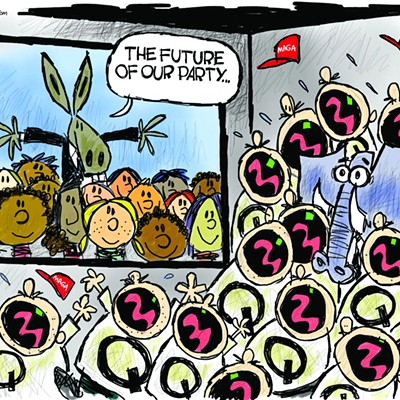In next year's general election, the issue may be barely a ripple. Activists on both sides of the preservation debate say they've agreed to stay away from the ballot box in 2002.
As you may recall, the Growth Lobby spent more than $4 million torpedoing the Sierra Club's growth-management initiative in 2000. That high-profile fight overshadowed the narrow defeat of Prop 100, a referendum from the legislature that would have slightly reformed the State Land Department.
The State Land Department oversees roughly 9 million acres of state land granted to Arizona at statehood by the federal government. Under the Arizona Constitution, the land must be managed for "highest and best use" for the beneficiaries of the trusts, with roughly 87 percent flowing to education funding.
To generate income for the educational trust, the state generally sells land for development, with the proceeds flowing into the Permanent State School Fund, which now totals about $1 billion, invested primarily in stocks and bonds. Interest from the accounts--about $72 million this year--goes to help fund the state's education spending.
Under the leadership of Gov. Jane Dee Hull and her appointee, Land Department director Mike Anable, the department has drastically accelerated its land-speculation mission.
The Land Department is now planning to develop 75 square miles of state land scattered around Tucson's southeastern border, projecting a population of more than 320,000 people by 2050. Anable has similar plans in the works on the edge of Maricopa County communities.
When the feds originally gave the land to the state in the early part of the last century, environmental issues were not a big concern. The land was basically laid out in a checkerboard grid.
Today, that means the state's holdings--some of which have become sensitive environmental parcels--are scattered across Arizona.
Prop 100, which was drawn up by the governor's office and state lawmakers, would have amended the Arizona Constitution to set aside up to 3 percent of state land for conservation purposes.
Although advocates said it was a step in the right direction, opponents--including mainstream enviros like Luther Propst of Tucson's Sonoran Institute, who had sat on the governor's Growing Smarter committee--complained it didn't do enough. In the end, their negative campaign was enough to sink Prop 100, which narrowly lost by about 2 percent at the polls.
Although Prop 100 went down, the question of state land reform was hardly solved. To forestall a citizen initiative aimed at state land reform, groups of attorneys, environmentalists, homebuilders and educators have been quietly meeting over the last year to find a compromise everyone can live with.
But homebuilders, increasingly frustrated by their perception that their concerns were being ignored, began working the education leadership, warning them educational funding is threatened if voters limit the sale of state trust land.
The strategy successfully flipped the education leadership. In an August op-ed in the Arizona Republic, four education officials representing school boards, teachers and administrators signed their names to an article complaining they had been left out of the debate over state land. They wrote that any solution would need to compensate the permanent fund for any potential financial losses from conservation.
The environmentalists remain convinced, based on polling data, that they would win a fight over the preservation of sensitive state land--but only if they keep the educational community on their side.
"All you have to have is a schoolteacher plant seeds of doubt and you lose," says one environmental activist.
Having realized the initiative process would be too much work without a better chance of winning, the conservation crowd has dropped any plan for an initiative next year.
Instead, all sides are continuing to talk. Along with abandoning the initiative for 2002, they've agreed they'll keep each other informed about their legislative efforts and continue negotiating in good faith.
With no reform on the ballot in 2002, the immediate future of the Land Department is now in the hands of the winner of next year's governor's race.
Will any of the candidates work the issue? Wait and see.

















